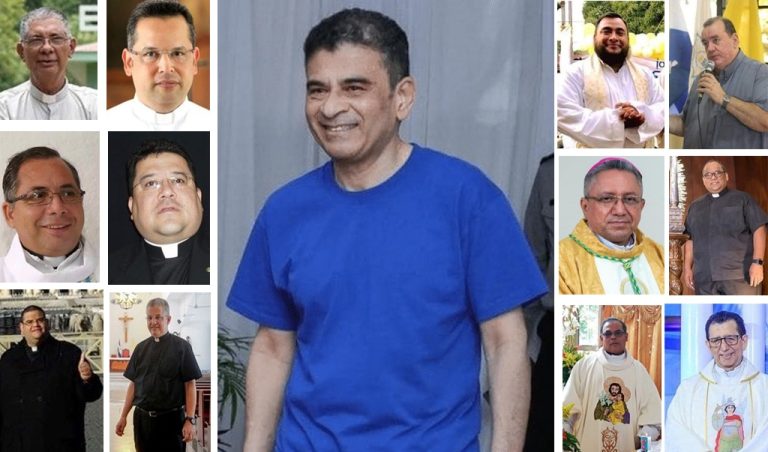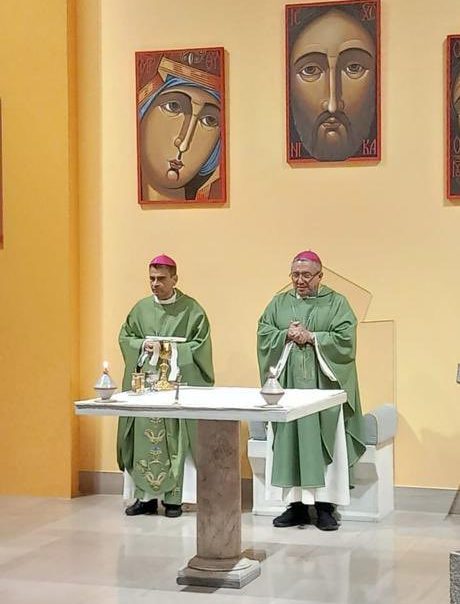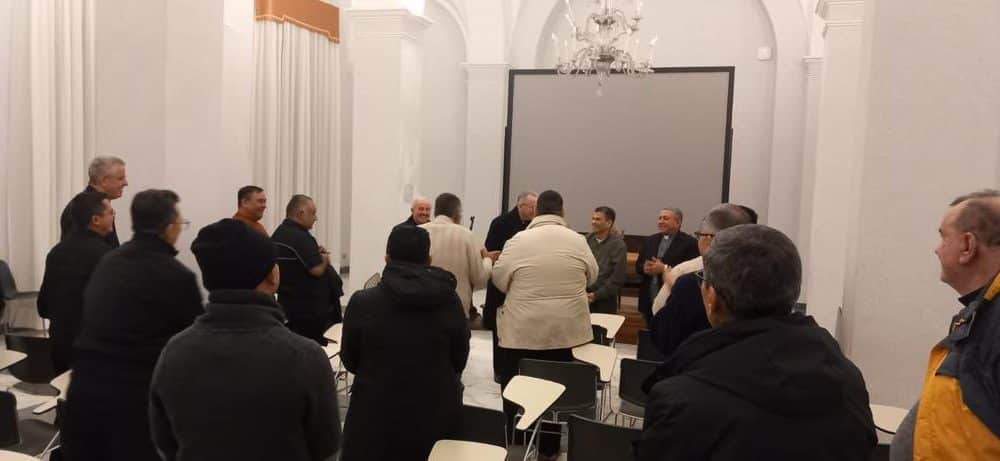14 de enero 2024

“NicaraguAmor” Cultural Caravan for Nicaraguans in the USA

PUBLICIDAD 1M
PUBLICIDAD 4D
PUBLICIDAD 5D
Bishops of Matagalpa and Siuna, 15 priests, and two seminarians were banished early this morning. More than 100 political prisoners remain in jail

The regime of Daniel Ortega and Rosario Murillo banished the bishop of Matagalpa, Monsignor Rolando Jose Alvarez to the Vatican early this Sunday, January 14, along with 18 other religious who were imprisoned between Christmas and New Year's holidays of December 2023. Bishop Alvarez was a political prisoner for more than a year and had been sentenced to 26 years in prison.
Among the other exiles are a bishop, 15 priests, and two seminarians held as political prisoners of the regime, sources linked to the Catholic Church in exile revealed to CONFIDENCIAL, while the Ortega-Murillo dictatorship and the Vatican have not yet provided any official information. More than 100 prisoners of conscience remain in the jails of the regime in Nicaragua.
Monsignor Alvarez, bishop of the Diocese of Matagalpa and apostolic administrator of the Diocese of Esteli, is one of the most heard pastoral and prophetic voices inside and outside Nicaragua in recent years.
The regime's police locked Monsignor Alvarez and a group of priests and lay people in the Episcopal Palace of Matagalpa on August 4, 2022. Fifteen days later he was transferred from Matagalpa to Managua under de facto house arrest.
On February 9, 2023, after refusing to accept the banishment order to the United States imposed by the regime on 222 political prisoners, Bishop Alvarez was taken out of house arrest and transferred to the maximum security cells of La Modelo prison, known as El Infiernillo. The following day, Judge Nadia Tardencilla Rodriguez, of the Second District Trial Court in Managua, sentenced him to 26 years and four months in prison in a process considered by experts as a “criminal action.”
A second attempt by the regime to banish Monsignor Alvarez occurred the first week of July 2023, this time through “contacts” established with the Vatican. But the bishop did not accept the terms imposed for his banishment and was returned to his cell in El Infiernillo on the morning of Wednesday, July 5.

One of those released was Monsignor Isidoro Mora, bishop of Siuna, a municipality located in the Mining Triangle of Nicaragua's Northern Caribbean.
Mora was arrested on December 20, 2023, along with two seminarians, one day after praying during a homily – transmitted through social networks – for Bishop Rolando Alvarez, sentenced in February 2023 to more than 26 years in prison for crimes considered treason after refusing to leave his country.
Bishop Mora, 63, was intercepted by the Police when he was on his way to the Santa Cruz parish, in the municipality of La Cruz de Rio Grande, where he was scheduled to perform confirmations to 230 parishioners.
“I would like to express the greetings of the Episcopal Conference (of Nicaragua). We are always united in prayer for this beloved Diocese of Matagalpa, praying for Monsignor Rolando, and praying for the journey of each one of you. We are united in prayer, in communion, in faith, in love, in tenderness,” said Monsignor Mora during the mass on the occasion of the 99th anniversary of the creation of the Diocese of Matagalpa, on Tuesday, December 19, in the Cathedral of St. Peter the Apostle.

The 15 priests sent to the Vatican belong to the Archdiocese of Managua, Masaya, and Carazo, headed by Nicaraguan Cardinal Leopoldo Brenes.
The priests who were released from prison are:
1. Priest Pablo Villafranca, pastor of the church Nuestro Señor de Veracruz in Nindiri, Masaya. 2.
2. Priest Hector Treminio, pastor of the Santo Cristo de Esquipulas church, Managua.
3. Monsignor Carlos Aviles, Vicar General of the Archdiocese of Managua.
4. Priest Fernando Calero, parish priest of Our Lady of Fatima Rancho Grande, Matagalpa.
5. Monsignor Marcos Díaz Prado, parish priest of Santo Tomas Apostol del Puerto de Corinto Church.
6. Monsignor Silvio Fonseca, pastor of Santa Faz Church. Vicar of Family, Children, and Youth of the Archdiocese of Managua.
7. Priest Mykel Monterrey, pastor of the church Nuestra Señora de Candelaria of the Archdiocese of Managua.
8. Priest Raul Zamora, pastor of Jesús de la Divina Misericordia Church of the Archdiocese of Managua.
9. Priest Gerardo José Rodríguez, pastor of the church Purísima Concepción, located in Reparto Belmonte of the Archdiocese of Managua.
10. Monsignor Miguel Mántica, parish priest of San Francisco de Asís church, located in Reparto Bolonia of the Archdiocese of Managua.
11. Priest Jader Hernández, pastor of Madre del Divino Pastor Church in Nejapa.
12. Priest Ismael Serrano, pastor of the San Miguel Arcangel church of the Archdiocese of Managua.
13. Priest Jose Gustavo Sandino Ochoa, pastor of the church Nuestra Señora de los Dolores in Santa María de Pantasma, Diocese of Jinotega.
14. Monseñor Óscar Escoto Salgado. Vicario general de la Diócesis de Matagalpa.
15. Sacerdote Jader Danilo Guido Acosta. Segundo vicario de la Catedral San Pedro Apóstol de Matagalpa.
The two seminarians released are Alester Saenz y Tony Palacios.
So far this year, Pope Francis has twice expressed his deep concern over the prolongation of the socio-political crisis in Nicaragua and the painful consequences it has left on society, in particular the Catholic Church.
“The situation in Nicaragua also continues to be worrisome; it is a crisis that has been dragging on for some time with painful consequences for the whole of Nicaraguan society, in particular for the Catholic Church,” the pontiff said during the traditional address at the beginning of the year to the diplomatic corps accredited to the Holy See.
On that occasion, he reiterated his invitation to the Government of Nicaragua to a “respectful diplomatic dialogue,” as he has been doing since the beginning of 2023.
On October 18 of last year, the Ortega-Murillo regime banished to the Vatican twelve priests it held as political prisoners, “after holding fruitful conversations with the Holy See.”
The priests banished on that occasion were: Manuel Salvador Garcia Rodriguez, Jose Leonardo Urbina Rodriguez, Jaime Ivan Montesinos Sauceda, Fernando Israel Zamora Silva, Osman Jose Amador Guillen, Julio Ricardo Norori Jimenez, and Cristobal Reynaldo Gadea Velasquez.
Also banished were priests Alvaro Jose Toledo Amador, Jose Ivan Centeno Tercero, Pastor Eugenio Rodriguez Benavidez, Yessner Cipriano Pineda Meneses, and Ramon Angulo Reyes.
The dictatorship has subjected 203 religious men and women to banishment, expulsion, or refusal of entry to Nicaragua, from 2018 to January 2024. More than 80% of these aggressions were recorded in 2023 when Ortega stepped up his onslaught against the Catholic Church.
“It was the year 2023 - the cruelest. Not because I say so, but because the figures prove it: 307 aggressions in 2023, plus 3600 prohibited processions, plus 237 prohibited masses in cemeteries. Kidnappings, sieges, permanent surveillance,” assures Martha Patricia Molina, researcher and author of the study “Nicaragua, a persecuted church?”
On February 9, 2023, the Ortega regime included eight religious figures in a group of 222 former political prisoners exiled to the United States. To these were added the twelve priests arrested and subsequently also exiled to the Vatican for a total of 20. Another 43, including priests, seminarians, and deacons, were forced into exile due to persecution and surveillance in their parishes. The last priest to leave the country to protect his freedom was Fernando Tellez, from the Archdiocese of Managua, according to an update of the attacks against the Church, prepared by Molina.
While another 31 religious, who were returning from spiritual formation trips, Catholic events, or for personal reasons, were prevented from entering the country, most of them being nationals. In none of the cases has the Directorate of Migration and Foreigners, a dependency of the resuscitated Ministry of the Interior (MINT), provided any justification in this regard.
Although the onslaught of the dictatorship has been against the entire Catholic Church, Ortega has raged against the Archdiocese of Managua – 242 aggressions – and the Diocese of Matagalpa –144 aggressions –, from 2018 to August 2023. These spaces are led by bishops critical of the regime, such as Bishop Alvarez, who is also apostolic administrator of the diocese of Esteli, and the auxiliary bishop of Managua, Silvio Baez, exiled in 2019, by order of Pope Francis.
Another 85 nuns had to leave the country after the closing of their congregations and the confiscation of their property imposed by the dictatorship. Of this number, seven were prevented from entering the national territory.
The Missionaries of Charity of St. Teresa of Calcutta, the Daughters of St. Louise de Marillac in the Holy Spirit, the nuns of the Poor Fraternity of Jesus Christ, and the Dominican Sisters of the Annunciation are some of the best-known examples of nuns that were forced to abandon their mission in Nicaragua by the regime.
This article was published in Spanish in Confidencial and translated by our staff. To get the most relevant news from our English coverage delivered straight to your inbox, subscribe to The Dispatch.
PUBLICIDAD 3M
Confidencial es un diario digital nicaragüense, de formato multimedia, fundado por Carlos F. Chamorro en junio de 1996. Inició como un semanario impreso y hoy es un medio de referencia regional con información, análisis, entrevistas, perfiles, reportajes e investigaciones sobre Nicaragua, informando desde el exilio por la persecución política de la dictadura de Daniel Ortega y Rosario Murillo.
PUBLICIDAD 3D